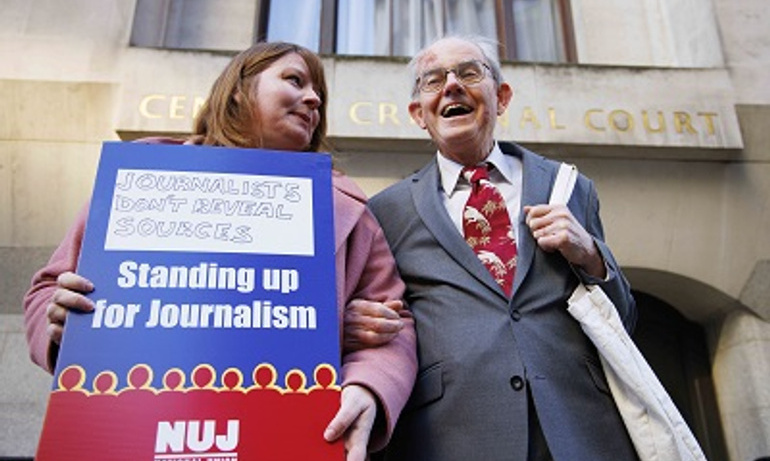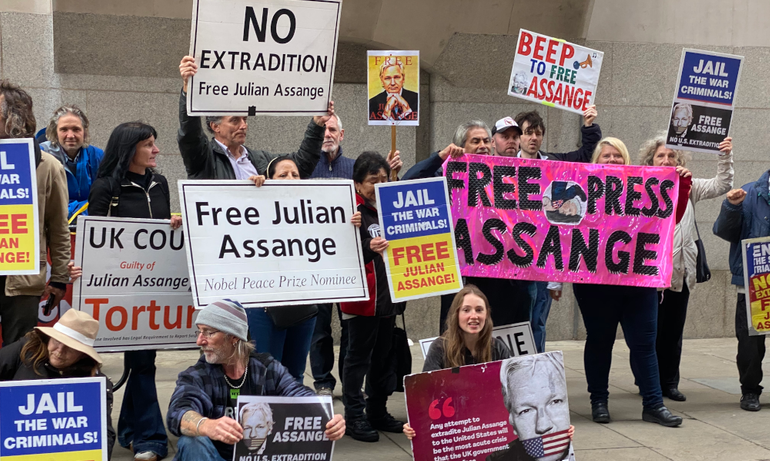Protection of sources
The NUJ's long history of defending the right of journalists to protect sources, is at the heart of the union's commitment to members.
The union's code of conduct details the key principles of UK and Irish journalism and states a journalist “protects the identity of sources who supply information in confidence and material gathered in the course of her/his work”. For journalists working across all sectors, this remains of critical importance in the work they do.
The issue
The NUJ is increasingly concerned about efforts from institutions to force the disclosure of source material from journalists, resulting not only in a breach of the code of conduct and protections in place for journalists, but with potential harmful impacts on public interest journalism too.
Journalists often rely on material shared in confidence by sources to inform stories and aid accurate reporting. Sources may ask to remain unnamed, in fear of threats from those their information references or exposes. Examples include when information is about individuals undertaking wrongdoing in powerful positions. Without the guarantee of anonymity, there is a risk that some sources may be too afraid to engage with journalists, fearing reprisal.
Know your rights
In England and Wales, journalistic material is protected from police seizure under the Police and Criminal Evidence Act (PACE). In practice, police must make an application to a judge who then determines whether material should be disclosed. Although PACE does not apply in Scotland, police must still seek a warrant to access journalistic material.
If you are asked to reveal your source material, you should contact the NUJ in the first instance, for legal assistance and support on next steps. The union’s in house legal team works with Thompsons Solicitors who can be contacted in emergencies on 0800 587 7530.
Read more about NUJ legal assistance.
The NUJ's safety toolkit gives advice on securing your communications.
Cases
1985-1986 Birmingham pub bombings
In February 2022, Chris Mullin, the journalist and former MP appeared at the Old Bailey to contest an order brought by West Midlands Police requiring him to disclose source material, relating to the 1985-1986 investigation of the Birmingham pub bombings. Mr Mullin, with the full backing of the NUJ, contested the application on grounds that disclosure would breach the principle of the need for journalists to protect their sources.
In March 2022, the NUJ welcomed a decision in the case not to grant the production order. In May, West Midlands Police confirmed they would not be appealing the decision. In a case that should never have been brought, the union's support for Mullin throughout was unwavering.
Watch Mullin speak with the NUJ about the order brought by West Midlands Police and why the right to protect sources is paramount.
No Stone unturned
In 2018, two Belfast-based investigative journalists and NUJ members, Trevor Birney and Barry McCaffrey, were arrested in connection with the alleged theft of a confidential report from the office of the Police Ombudsman for Northern Ireland. The leaked unredacted report was sent to the journalists by an anonymous source and related to a police investigation into the killing of six men in Loughinisland, Northern Ireland in 1994. It featured in the film No Stone Unturned, telling the story of victims and their families.
When arrested, both journalists had their homes raided, and in 2018 they challenged the legality of search warrants used by the police at the time. They were successful in their challenge at judicial review stage supported by the NUJ. An excerpt from the full judgement accessed below, read:
"We see no overriding requirement in the public interest which could have justified an interference with the protection of journalistic sources in this case".
Although a significant achievement for Birney, McCaffrey and the NUJ, the judgement was important too, for every journalist abiding by the principle of source protection.
Julian Assange
The prosecution of Julian Assange by the United States government and efforts to extradite him were strongly opposed by the NUJ. The Wikileaks founder was accused of protecting a source and faced several charges including many under the Espionage Act, for leaking classified information over a decade ago.
The pursuit of charges against Assange presented a threat to freedom of expression with wide-ranging detrimental impacts for journalists and the environments in which they operate. In June 2024, the union welcomed news of Assange's release, following confirmation of a plea deal reached with US authorities.
Investigatory Powers Act 2016 (Snoopers' charter)
In May 2023, the NUJ intervened in Liberty's Court of Appeal case on the Investigatory Powers Act. The union believes the Act threatens journalistic communications and the right of journalists to protect sources – putting at risk the ability of journalists to report public interest stories.
In August, the NUJ and Liberty welcomed the court's decision upholding the argument that the regime for sharing material from bulk personal datasets with overseas states is unlawful. Government has committed to amend the primary legislation on bulk interception by way of a remedial order. The NUJ is disappointed, however, that the court ruled against other arguments put forward in the challenge, for example in relation to the insufficient safeguards to limit the use of the powers conferred on the government in the Act. Find out more on the legal action.
NUJ supporting members through the years
The NUJ's backing of cases defending the right to protect sources is long-standing. In the 1980s and 1990s we supported journalist Bill Goodwin taking his case to the European Court of Human Rights in Strasbourg. The court ruled in his favour and determined that journalists can indeed protect sources and have every right to do so. Their judgement stated:
“Protection of journalistic sources is one of the basic conditions for press freedom ...without such protection, sources may be deterred from assisting the press in informing the public on matters of
public interest. As a result the vital public watchdog role of the press may be undermined and the ability of the press to provide accurate and reliable information may be adversely affected.”
In 1999, Ed Moloney received a court order under the Terrorism Act requesting he hand over notes of an interview with William Stobie, a member of an illegal paramilitary group in Belfast charged with the murder of lawyer Pat Finucane. The order brought by Scotland Yard detectives leading the case, was sought on the belief that Moloney's interview notes contained evidence that would aid the investigation.
Moloney refused to hand over his notes, stating doing so "has serious negative implications for journalists everywhere in Ireland" and that the protection of sources was critical to building trust with individuals as a journalist. Belfast's High Court ruled in October 1999 that Moloney did not need to supply police with his notes, overruling a previous court decision. The victory was welcomed by the NUJ who had stood beside Moloney from the very start. The landmark decision was a positive outcome for journalists steadfast in their commitment to protect sources.
Despite judgements since the 1980s establishing journalists are protected in law from disclosing source material, threats to this core ethical principle have been battled by the union and members in every decade since. In 2013, the NUJ supported journalist James Parkinson as he contested a production order insisting he hand over recordings of an EDL march. Two years earlier the union had supported him against an order to provide footage of evictions in Dale Farm.
In an article for NUJ Informed, Michelle Stanistreet, NUJ general secretary reflected on several legal challenges the union has supported, spanning four decades.
Protecting sources throughout the pandemic
In March 2020, the NUJ condemned reports of key workers threatened for speaking to journalists about shortages of personal protection equipment. The union defended journalists’ right to protect their sources, many of whom were providing information key to public interest journalism as news of the pandemic broke.
Michelle Stanistreet said at the time:
"At a time when accurate information and quality journalism is more vital than ever, it is outrageous that brave healthcare workers are being threatened with disciplinary action if they speak out to journalists. It is particularly disgraceful to gag workers who are rightly speaking out to highlight the shortage of critical protective equipment”.
Download our protection of sources poster.
Action for members
- help us raise awareness of this campaign by sharing this page on social media
- talk to colleagues about the NUJ's commitment to supporting our members and their right to protect sources
NUJ guidance


